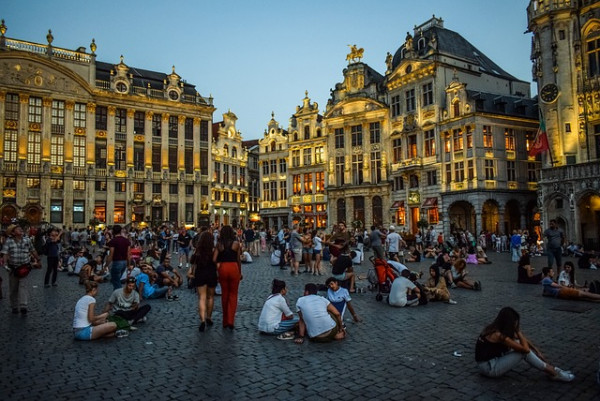Don’t let the presence of European administrators let you make the assumption that Brussels isn’t hip, happening and historic. This is a cool city, the largest in Belgium, and there’s plenty of choice when it comes to entertainment, and to accommodation.
Central Brussels, which radiates out from Grand Place, is beautiful, with plenty of elegant Flemish and Art Nouveau architecture, and an inspiring collection of museums and galleries. The streets around the Avenue Louise are a luxurious backdrop — this is where you'll find the best shopping: luxury or antique. Brussels is also a well known foodie destination, come here for your fix of Belgium beers, moules frites or chocolate.
You may worry about the prevalence of European Institutions, but they have plenty to offer visitors, including the Parlamentarium, a fabulous museum about the European parliament, and the House of European History Museum. The presence of so many European administrators also really adds to the diversity of Brussels’ accommodation and hospitality options — and it’s not just business hotels. Brussels is also a fantastic place for families to visit.
 Image by Dimitris Vetsikas fro
Image by Dimitris Vetsikas fro
The Grand Place is actually a single, World Heritage listed square in central Brussels, boasting a wealth of graceful, 17th century Flemish design, and incredibly significant historically. It’s cobbled, adorned with gilded statues, and right beside the Town Hall and the Maison du Roi (the King’s house). These days the Grand Place is used for festivals, concerts and fairs, and it hosts a very atmospheric historic Christmas Market. Some of the buildings that line the square were (and still are) guildhalls, however others have been turned into luxurious bars, restaurants and cafés, or even accommodation. In the block just back from the square itself you will find the Museum of the City of Brussels, the Galleries Royales Saint-Hubert; the Magritte Museum and Brussels Cathedral. The beautiful Manneken and Jeanneke statues are also within the Grand Place neighbourhood, on Rue des Bouchers. This area also has plenty of chocolate shops, restaurant and cafes, and opportunities to purchase Belgian beer and chips.
Discover our recommended hotels near Grand Place
 Image by Waldo Miguez from Pix
Image by Waldo Miguez from Pix
Elegant and distinguished, the Sablon neighbourhood is where the nobility once lived. The architecture offers more visual variety than the Grand Place, but there’s a grand affluence to it. However many of the beautiful old buildings are no longer single residences, and there’s some lovely upscale accommodation to be found here. This part of Brussels has always been known for its restaurants and boutique shopping, and today there are plenty of cool options, as well as chic ones, with great cafes and contemporary art galleries in amongst the antique shops and chocolatiers – including Pierre Marcolini. On the weekend the Place du Grand Sablon hosts an antiques market, but at other times it is lined with some of the nicest places to eat and drink in Brussels – if you’re looking for good value head down one of the side streets. The Place du Petit Sablon has one side taken up by the Gothic Church of the Notre-Dame Sablon. This is a great neighbourhood to stay in if you’re a lover of art or antiques, or medieval architecture.
Discover our recommended hotels in Sablon
 Image by NakNakNak from Pixaba
Image by NakNakNak from Pixaba
The neighbourhood around the European parliament, and the European headquarters for many facets of the European Union, is actually a really good neighbourhood for visitors to stay in. You might think of it as heavy on the business hotels, but there’s plenty of varied accommodation – including more elegant art nouveau townhouse conversions – and a number of lovely of parks and green spaces. This is also a very liveable part of the city, with lots of great places to eat and drink with a range of atmospheres. It is also super central, while having its own museums and galleries, as well as all the EU sightseeing including the Parlamentarium and the House of European History. The Museum of Natural Sciences, the Art and History Museum, the Wierz Museum, and Autoworld are also in this neighbourhood.
Discover our recommended hotels in the European Quarter
 By Jopparn - Own work, CC BY-SA 3.0
By Jopparn - Own work, CC BY-SA 3.0
Ixelles is a lively neighbourhood to the east of the Grand Place. Its two universities give it a youthful vibe: the nightlife is colourfully fun; the café, restaurant and bar scene ranges widely in cuisine and atmosphere; and Ixelles has great public transport links. There are quiet, residential pockets too, and it’s along these streets that art nouveau townhouses and chic, art deco apartment blocks have been converted into hotels and aparthotels. It’s here that you’ll come across the Musée d’Ixelles, which has a wonderful permanent collection that includes works by Matisse, Picasso, Miró and Toulouse-Lautrec. If you’re hoping for some green space, the Ixelles neighbourhood has the Etangs d’Ixelles, and the gardens of the Abbaye de la Cambre.
Discover our pick of the best hotels in Ixelles
Saint-Gilles is next door to Ixelles, slightly outside of central Brussels. If you like a trendy café, bar or bistro, art nouveau or art deco architecture, and art and design, then the Saint-Gilles neighbourhood is a good match. It used to be its own village, and has its own impressive town hall building: a French renaissance revival building topped by a 41 metre belfry, and its own prison, which looks like a fortified caste. Contemporary Saint-Gilles is also known for its artists and galleries, and its hip gastronomy – which still relies heavily on Belgian traditions. If you’re interested in Belgian beer visit the Cantillion brewery which has something of a beer museum and if you want to do any shopping, save your euros for the Midi Market at the Brussels-South Railway Station.
Discover our recommended hotels in Saint Gilles